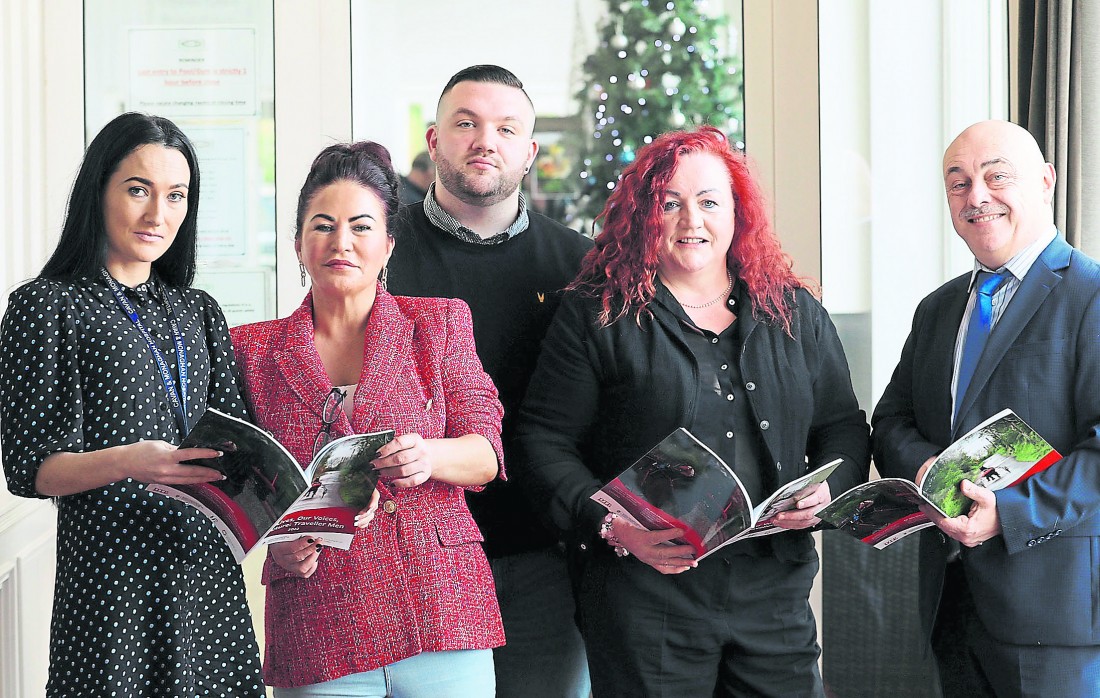A LANDMARK study on Traveller men’s mental health and wellbeing was launched last week in the Clanree Hotel, Letterkenny.
The research is significant as it was the first of its kind to be conducted “by, with and for Traveller men”.
The statistics on Traveller men’s mental health are stark, they are found to have a higher rate of suicide than any other group in Ireland.
Despite constituting less than one per cent of the Irish population, Traveller males account for ten per cent of young male suicide statistics.
The author of the research, David Friel, is an Irish Traveller.
He holds a BSc in Health and Social Care, an MA in Social Care and Social Justice and he is currently undergoing his PhD with Atlantic Technological University.
He was the first Traveller in the north west to hold a Master’s degree.
Mr Friel explained that a lot of the already published research was conducted without actually consulting Travellers themselves.
This study aimed to engage Traveller men to gain an insight into their lived experience, to identify key risk factors that impact on their mental health.
“This is significant as this qualitative research is the first known study of Traveller men’s mental health and the challenges and experiences in Donegal.
“I have the responsibility to ensure that their lives, their voices and their aspirations for the future are heard,” said Mr Friel.
The study consisted of 12 Traveller men from Donegal, aged 18-60 from a broad range of backgrounds. It included men of different sexual orientation, those in a range of accommodation situations including homelessness, differing employment and education statuses, and experiences in incarceration.
Michael Mongan, a community Healthcare Worker, with the Donegal Travellers Project (DTP), added that the research was “very important” because of the Traveller representation throughout the process.
The study identified social determinants such as accommodation, education, employment and poverty, and physical health.
The risk factors identified included high levels of bereavement, misusing drugs or alcohol as a coping mechanism, and suicidal feelings.
More than half of the participants reported experiencing suicidal ideation or attempting suicide in the past.
The study exposed the negative experiences Traveller men had with their GPs and mental health services and how this created a general distrust, which discouraged them from seeking help again. This was due to a lack of cultural competence, or because of bias and discrimination.
Another factor was the internal and external stigma or “shame” associated with seeking help with their mental health and the normative notion that Traveller men must “suppress” their emotions.
These harmful perceptions particularly affected Travellers from the LGBTQ community.
Structural racism in the form of ethnic policing was also highlighted to negatively impact their mental health, the use of racial slurs, wrongful convictions and involuntary interactions were all identified as chronic stressors.
All of the men who participated said they had negative experience from the Gardaí.
“This awareness now needs radical action” said Mr Friel, as he outlined his evidence based recommendations to many influential stakeholders present at the launch.
Mags Casey, a Traveller and prominent community activist, agreed and said that we need urgent action.
“We all have a responsibility for what is happening to Travellers in Irish society, and a responsibility to make an equal society for all,” she said.
The recommendations published included an interagency working group to be established between Donegal County Council and DTP, a dedicated policing plan from An Garda Síochána to develop a better relationship with the community, and anti-racism and discrimination training for all primary care teams to improve the experience of Traveller men seeking help with their mental health.
Mr Friel said he would like to see “a commitment at local, regional and national levels to create conditions for Traveller men to be free from the social, structural, cultural and economic determinants that negatively impact their mental health”.
‘Our Lives, Our Voices, Our Future’ was officially launched by Dr. John McCardle, the Area Director of Mental Health Nursing in Donegal.
Those in attendance included Independent TD Thomas Pringle, Senator Eileen Flynn, Bishop Alan McGuckian, and members of An Garda Síochána.
Ms Casey and Senator Flynn both praised the research and said it must be replicated a national level.










